Township Treebune, Issue No. 2: "The Dreaded Mulch Volcano"
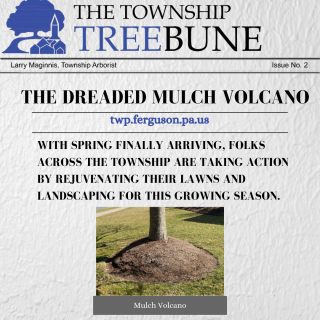
With spring finally arriving to the Centre region, folks across the Township are taking action by rejuvenating their lawns and landscaping for this growing season. Included in this ritual is the refreshing and application of mulch in the form of shredded bark or other tree byproducts.
Incorporating mulch can be a valuable tool in enhancing both the image of your landscape as well as the health of your plants and trees. It serves a variety of functions in that it retains moisture in the hot summer months, prevents weeds from establishing and provides a buffer to protect trees from errant lawn mower and string trimmer damage. As an additional benefit, as the mulch breaks down, nutrients are introduced to the soil and help improve soil conditions.
Unfortunately, over applications of mulch can have adverse effects on trees over the long term. There is currently a phenomenon of over mulching that is proving to be one of the largest human related threats to landscape trees. The over mulching often manifests itself in the shape of a mound or volcano around the trunk of the tree. Hence, tree care professionals refer to the byproduct of this over mulching as a Mulch Volcano.
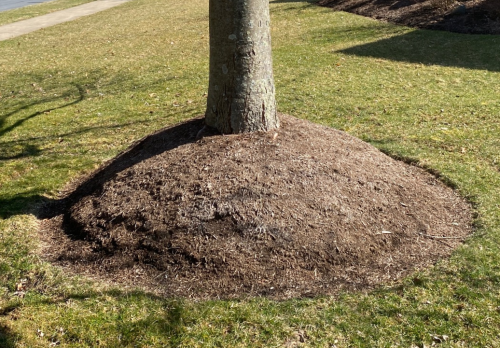
Mulch Volcano
There are a number of ways over mulching or mulch volcanoes can negatively impact trees. When soil is placed around the tree trunk, there is a potential that the tree will grow advantageous or girdling roots around the trunk of the tree. As the tree and roots grow, a strangling affect occurs and the tree can suffer a slow demise and effect the stability of the roots and tree.
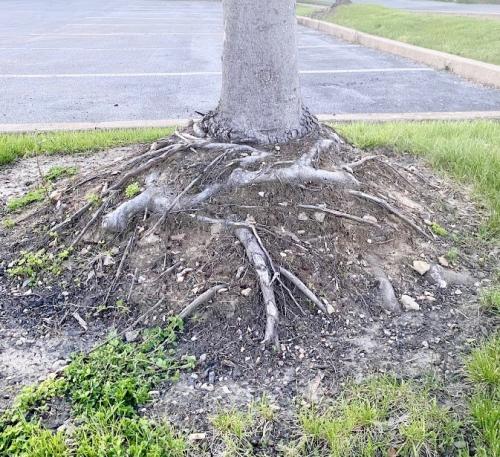
Adventitious and Girdling Roots Uncovered Below Mulch
In addition, when mulch is placed around the trunk of the tree, it causes decay affecting the tree’s ability to feed itself completely. The tissue just inside the bark is responsible for spreading converted nutrients throughout the tree, including its root system. When decay occurs at the trunk of the tree, the entire tree including the roots, does not receive the necessary nutrients it needs to thrive and begins to decline.
Trees in the urban environment experience a number of stressors. These stressors weaken the trees and leave them vulnerable to other pathogens such as insects or diseases. By eliminating over mulching, we decrease these stressors.
When Mulching Your Trees
When mulching your trees and landscape, the conventional wisdom is to mulch outward not upward. For young trees, a rule of fours is commonly used. Apply it 4 inches thick, 4 inches away from the trunk, and 4 feet outward. For mature trees, it is also 4 inches thick, 4 inches away from the trunk and as wide as possible.
If you employ a landscape maintenance contractor, there may be a financial benefit to over mulching. Strongly advise to ensure over mulching and mulch volcanoes do not occur.
If you identified trees on your property that have been over mulched, simply pull the mulch away from the trunk and spread it outward maintaining a maximum 4 inch thickness.
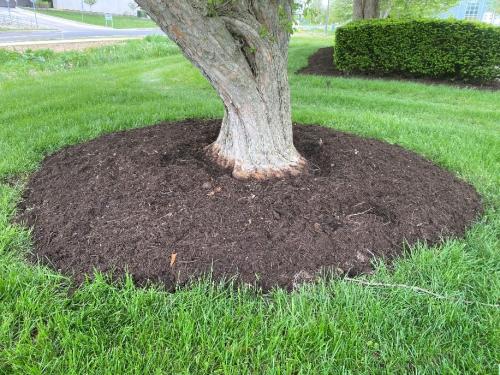
Proper Mulching Technique with Exposed Root Flare
There is no research or any tree care professionals that support mulch volcanoes or the over mulching of trees. Please do your part to ensure the long-term survival of your trees and landscape by identifying these shortfalls and addressing them.
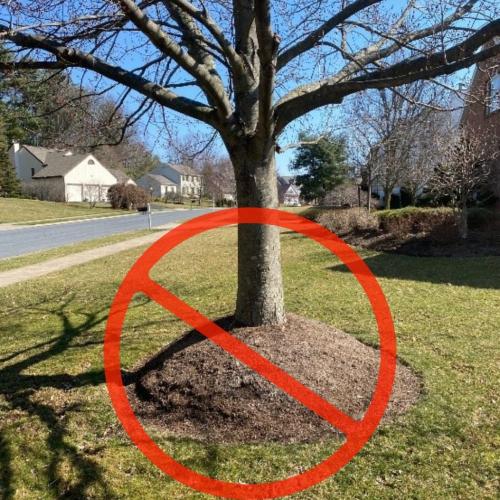
No Mulch Volcanoes
Please visit www.treesaregood.com for additional tree maintenance resources or Proper Mulching Techniques for additional information on this subject.
Please remember, it is unlawful to volcano mulch Township owned street trees. These trees are generally located in the Right-of-Way between the sidewalk and curb. Some Rights-of-Way are not easily identifiable. A simple call to the Township office can help you identify the responsible party.
If you have any questions regarding your street trees, email arborist@twp.ferguson.pa.us or call (814) 238-4651.

